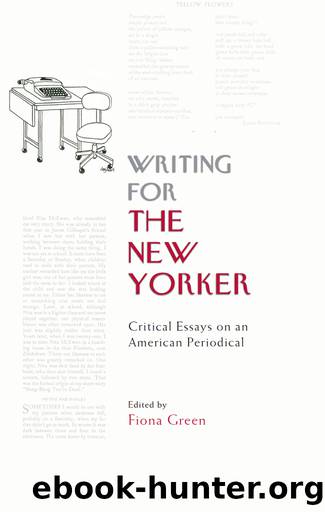Writing for the New Yorker by Green Fiona;

Author:Green, Fiona;
Language: eng
Format: epub
Publisher: Edinburgh University Press
The exaggerated tone and self-deprecating silliness of this passage, mixing images of transfiguration with virginal deflowering bears comparison with Plathâs account of her first New Yorker acceptance: âthe realisation of ten years of hopeful wishes and waits (and subsequent rejections)â. In both cases she imagines her arrival along the lines of sexual gratification and material dissolution, becoming weightless and insubstantial, a floating ânimbusâ and a tiny âbeanâ. The similarities between these two journal entries highlight the erotic aspect of Plathâs attraction to the glossy magazine and the perfect surface in which she might delete and re-make herself. In both instances, she creates a narrative set-piece which depicts the surrender of self-sacrifice. In both cases she juxtaposes The New Yorkerâs smoothness, sophistication and âthin[ness]â with a release from the âpodgyâ flab of everyday life. As with the âSunday lambâ, her self-sacrifice leads to renewal and rebirth.
Taking up space
On 24 February 1961, Moss sent Plath a first-reading agreement with The New Yorker together with a very welcome hundred dollar signed bonus and a cost of living agreement.33 Between February 1961 and February 1963, she sent him seventy-three poems (including nearly every poem that would go into Ariel) and he rejected sixty-four, publishing only âTulipsâ in the spring of 1962 and âBlackberryingâ in the autumn. When Plath died in February 1963, Moss still had seven of her poems in reserve. After her death, he sought permission to publish them in a single issue, which contained no other verse. They appeared on an otherwise bare double-page spread under a heading that read simply âSeven Poemsâ. At the bottom right corner of the right-hand page was Sylvia Plathâs name and the bracketed dates of her short life: (1932â1963).34 It was unprecedented for a double-page spread to be devoted entirely to showcasing a single poetâs work. The startling visual effect together with the dates at the bottom sent a clear message. Readers had no choice but to construe the poems within the narrative of Sylvia Plathâs life and premature death.
The poems were âTwo Campers in Cloud Countryâ, âThe Elm Speaksâ, âMysticâ, âAmnesiacâ, âMirrorâ, âAmong the Narcissiâ and âThe Moon and the Yew Treeâ. For Plath, who had in 1958 fixated on the âshiny white New Yorker space around [her] two column poemâ, the appearance of seven works surrounded by the luxury of empty space would no doubt have seemed a triumph. The double-page spread of âSeven Poemsâ was not only free of cartoons, advertisements and other New Yorker distractions, but was also positioned between two short stories, so acting itself as a kind of story, and not a âplace for the eyeâ to rest while perusing a longer work. The bracketed dates of Plathâs birth and death did not give any sense of when the individual poems were written, nor of their order of composition. Readers would not have known that only âMysticâ was written in 1963, close to the time of Plathâs suicide. In this context, even a comparatively early poem such as âThe Elm Speaksâ (April 1962) might be taken as a suicide note.
Download
This site does not store any files on its server. We only index and link to content provided by other sites. Please contact the content providers to delete copyright contents if any and email us, we'll remove relevant links or contents immediately.
4 3 2 1: A Novel by Paul Auster(12372)
The handmaid's tale by Margaret Atwood(7756)
Giovanni's Room by James Baldwin(7325)
Asking the Right Questions: A Guide to Critical Thinking by M. Neil Browne & Stuart M. Keeley(5757)
Big Magic: Creative Living Beyond Fear by Elizabeth Gilbert(5754)
Ego Is the Enemy by Ryan Holiday(5413)
The Body: A Guide for Occupants by Bill Bryson(5080)
On Writing A Memoir of the Craft by Stephen King(4931)
Ken Follett - World without end by Ken Follett(4722)
Adulting by Kelly Williams Brown(4565)
Bluets by Maggie Nelson(4547)
Eat That Frog! by Brian Tracy(4525)
Guilty Pleasures by Laurell K Hamilton(4439)
The Poetry of Pablo Neruda by Pablo Neruda(4097)
Alive: The Story of the Andes Survivors by Piers Paul Read(4018)
White Noise - A Novel by Don DeLillo(4002)
Fingerprints of the Gods by Graham Hancock(3994)
The Book of Joy by Dalai Lama(3974)
The Bookshop by Penelope Fitzgerald(3843)
